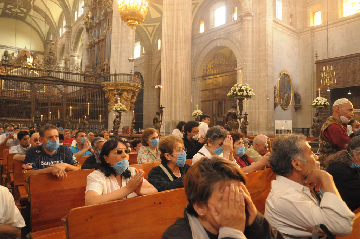UNIT 7: INDIVIDUAL AND COLLECTIVE RIGHTS
16. Dealing with Pandemics
Pandemics today are potentially even more deadly due to the increasing global movement of people and products. Pandemics provide both a challenge and an opportunity for liberal governments. On one hand, governments must consider the common good
that might entail restricting personal freedoms including mobility and privacy rights. On the other hand, they can work effectively for the common good through public health and education programs.


Pidiendo por el fin de la epidemia Praying for the end of the epidemic. Mexico City ©Courtesy Sari Dennise
Throughout history, societies have been faced with sudden outbreaks of seemingly unstoppable diseases. The Spanish Flu outbreak of 1918 left 50 to 100 million dead, and the Black Death of the Middle Ages killed about 25 million.
The photo shows a number of people praying in a church, many wearing surgical masks. These people are residents of Mexico City during the H1N1 or "swine flu" pandemic of 2009, which left over 14 000 dead around the world. Many people in Mexico were already infected with the virus before the seriousness of the outbreak was realized. Within days of the virus being recognized as a pandemic, Mexico City was effectively shut down. Some countries cancelled flights to Mexico while others halted trade, and still other recommended only essential travel for their citizens.
People leaving Mexico were screened for flu symptoms. In China, people returning from flu affected areas were quarantined, and other nations encouraged people with flu-like symptoms to stay in their homes.
The photo shows a number of people praying in a church, many wearing surgical masks. These people are residents of Mexico City during the H1N1 or "swine flu" pandemic of 2009, which left over 14 000 dead around the world. Many people in Mexico were already infected with the virus before the seriousness of the outbreak was realized. Within days of the virus being recognized as a pandemic, Mexico City was effectively shut down. Some countries cancelled flights to Mexico while others halted trade, and still other recommended only essential travel for their citizens.
People leaving Mexico were screened for flu symptoms. In China, people returning from flu affected areas were quarantined, and other nations encouraged people with flu-like symptoms to stay in their homes.
WHO Organization: fighting Influenza Pandemics
Read "Pandemics" on pages 430 to 431 and "SARS in Toronto" on pages 432 to 433 of your text Perspectives on Ideology.
Consider the following questions:
- Should liberal democracies restrict individual freedoms to protect their own citizens?
- When is the common good more important than individual rights and freedoms?